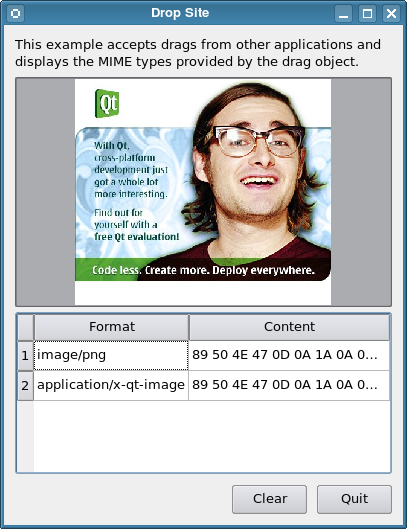DropSiteWindow Class Implementation
In the constructor of DropSiteWindow, we instantiate abstractLabel and set its wordWrap property to true. We also call the adjustSize() function to adjust abstractLabel's size according to its contents.
DropSiteWindow::DropSiteWindow()
{
abstractLabel = new QLabel(tr("This example accepts drags from other "
"applications and displays the MIME types "
"provided by the drag object."));
abstractLabel->setWordWrap(true);
abstractLabel->adjustSize();
Then we instantiate dropArea and connect its changed() signal to DropSiteWindow's updateFormatsTable() slot.
dropArea = new DropArea;
connect(dropArea, SIGNAL(changed(const QMimeData*)),
this, SLOT(updateFormatsTable(const QMimeData*)));
We now set up the QTableWidget object, formatsTable. Its horizontal header is set using a QStringList object, labels. The number of columms are set to two and the table is not editable. Also, the formatTable's horizontal header is formatted to ensure that its second column stretches to occupy additional space available.
QStringList labels;
labels << tr("Format") << tr("Content");
formatsTable = new QTableWidget;
formatsTable->setColumnCount(2);
formatsTable->setEditTriggers(QAbstractItemView::NoEditTriggers);
formatsTable->setHorizontalHeaderLabels(labels);
formatsTable->horizontalHeader()->setStretchLastSection(true);
Two QPushButton objects, clearButton and quitButton, are instantiated and added to buttonBox - a QDialogButtonBox object. We use QDialogButtonBox here to ensure that the push buttons are presented in a layout that conforms to the platform's style.
clearButton = new QPushButton(tr("Clear"));
quitButton = new QPushButton(tr("Quit"));
buttonBox = new QDialogButtonBox;
buttonBox->addButton(clearButton, QDialogButtonBox::ActionRole);
buttonBox->addButton(quitButton, QDialogButtonBox::RejectRole);
connect(quitButton, SIGNAL(pressed()), this, SLOT(close()));
connect(clearButton, SIGNAL(pressed()), dropArea, SLOT(clear()));
The clicked() signals for quitButton and clearButton are connected to close() and clear(), respectively.
For the layout, we use a QVBoxLayout, mainLayout, to arrange our widgets vertically. We also set the window title to "Drop Site" and the minimum size to 350x500 pixels.
QVBoxLayout *mainLayout = new QVBoxLayout;
mainLayout->addWidget(abstractLabel);
mainLayout->addWidget(dropArea);
mainLayout->addWidget(formatsTable);
mainLayout->addWidget(buttonBox);
setLayout(mainLayout);
setWindowTitle(tr("Drop Site"));
setMinimumSize(350, 500);
}
We move on to the updateFormatsTable() function. This function updates the formatsTable, displaying the MIME formats of the object dropped onto the DropArea object. First, we set QTableWidget's rowCount property to 0. Then, we validate to ensure that the QMimeData object passed in is a valid object.
void DropSiteWindow::updateFormatsTable(const QMimeData *mimeData)
{
formatsTable->setRowCount(0);
if (!mimeData)
return;
Once we are sure that mimeData is valid, we iterate through its supported formats using the foreach keyword. This keyword has the following format:
foreach(variable, container)
In our example, format is the variable and the container is a QStringList, obtained from mimeData->formats().
Note: The formats() function returns a QStringList object, containing all the formats supported by the mimeData.
foreach (QString format, mimeData->formats()) {
QTableWidgetItem *formatItem = new QTableWidgetItem(format);
formatItem->setFlags(Qt::ItemIsEnabled);
formatItem->setTextAlignment(Qt::AlignTop | Qt::AlignLeft);
Within each iteration, we create a QTableWidgetItem, formatItem and we set its flags to Qt::ItemIsEnabled, and its text alignment to Qt::AlignTop and Qt::AlignLeft.
A QString object, text, is customized to display data according to the contents of format. We invoke {QString}'s simplified() function on text, to obtain a string that has no additional space before, after or in between words.
QString text;
if (format == "text/plain") {
text = mimeData->text().simplified();
} else if (format == "text/html") {
text = mimeData->html().simplified();
} else if (format == "text/uri-list") {
QList<QUrl> urlList = mimeData->urls();
for (int i = 0; i < urlList.size() && i < 32; ++i)
text.append(urlList[i].toString() + " ");
} else {
QByteArray data = mimeData->data(format);
for (int i = 0; i < data.size() && i < 32; ++i) {
QString hex = QString("%1").arg(uchar(data[i]), 2, 16,
QChar('0'))
.toUpper();
text.append(hex + " ");
}
}
If format contains a list of URLs, we iterate through them, using spaces to separate them. On the other hand, if format contains an image, we display the data by converting the text to hexadecimal.
int row = formatsTable->rowCount();
formatsTable->insertRow(row);
formatsTable->setItem(row, 0, new QTableWidgetItem(format));
formatsTable->setItem(row, 1, new QTableWidgetItem(text));
}
formatsTable->resizeColumnToContents(0);
}
Once text has been customized to contain the appropriate data, we insert both format and text into formatsTable with setItem(). Lastly, we invoke resizeColumnToContents() on formatsTable's first column.
The main() Function
Within the main() function, we instantiate DropSiteWindow and invoke its show() function.
int main(int argc, char *argv[])
{
QApplication app(argc, argv);
DropSiteWindow window;
window.show();
return app.exec();
}























